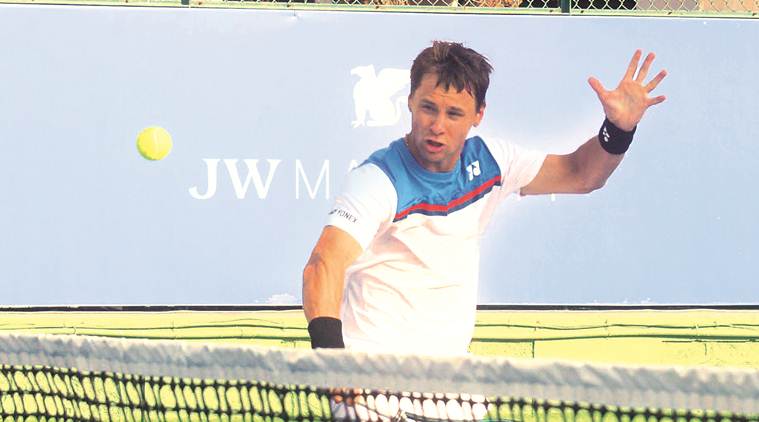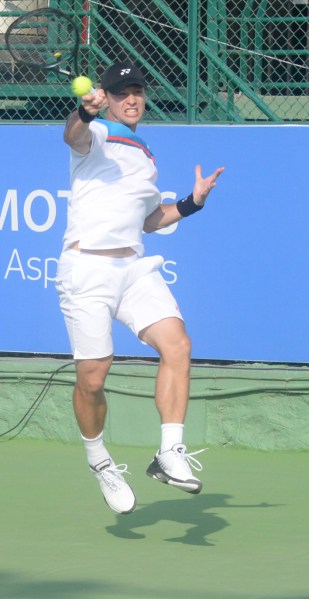 Lithuania’s Ricardas Berankis was the first-ever player from his country to win a junior Grand Slam title, at the US Open in 2007. (Express Photo by Daniel Stephen)
Lithuania’s Ricardas Berankis was the first-ever player from his country to win a junior Grand Slam title, at the US Open in 2007. (Express Photo by Daniel Stephen)
There was nothing but silence that greeted Ricardas Berankis, the second seed, when he walked onto the centre court at the Balewadi Tennis Stadium in Pune. Then again, there weren’t many souls in the stands who had bought tickets and come to watch Wednesday’s opening match at the Tata Open Maharashtra.
After all, the 29-year-old isn’t the biggest name in the tennis world, and certainly not a crowd-puller. He has, however, beaten a host of players who’ve gone on to become top 10 stars — Grigor Dimitrov, Kevin Anderson, David Goffin, Karen Khachanov and Lucas Pouille.
However, injuries have forced the current world no. 73 to rise no further than 50. But he remains faithful to the process. “Of course, we were playing at the same level at one point, maybe now they’re higher-ranked players, but you know, everybody’s having their own career, their own ups and downs and maximum to where you can reach,” he says. “So it comes to this point where you say, ‘Bravo, he did better than you’. But the careers have not finished yet. So we’ll see how it goes.”
 Express Photo by Daniel Stephen
Express Photo by Daniel StephenBerankis is a firm believer in the process – the gruelling journey of training, facing the hot sun or torturous cold when on court, enjoying the highs of a win and braving the heartbreak of defeat. Along the way, there were injuries to contend with, and Berankis has had many. But when you come from Lithuania, an Eastern European country with no tennis culture, the ‘process’ is bound to be different.
But Berankis is no new name on the tour. He was once a prodigy who had scaled the youth charts, occupying the junior world no. 1 spot, winning the prestigious Orange Bowl tournaments in the U14 (2004) and U18 (2007) levels – beating Dimitrov for the title in the latter. And then he’d go on to become the first-ever player from his country to win a junior Grand Slam title, at the US Open in 2007. Those achievements did set up a good future for him, but coming from Lithuania where he never had expectations, ‘pressure’ was a new ailment.
“Yes, there were a lot of expectations, but tennis in juniors and men’s is a completely different sport,” he says. “In the beginning when the expectations are high, then you fall very low. It’s better not to have these huge expectations and instead follow your own way. Then it’s easier to maintain.” The pressure did follow, and when he started to get the hang of the tour two years after turning professional in 2007, the injuries he had not worked to prevent as a junior started to creep up on him.
“We were believing a lot that what we were doing was the right way, even though we made huge mistakes in my career. What can I say? If you believe you can do it, you’re doing it,” he says about going through the recovery phase following groin (2012) and hip (2017) surgeries. “We have quite a good life as tennis players. And what else could I do at 28-29? I’m more than happy to have this chance to play professional tennis. that’s been my motivation.”
Despite coming from a country with no background in the sport, tennis, oddly enough, started for Berankis when he was just two. “My sister is six years older and she used to play. So I used to follow her to the courts. I don’t know how it started because I was two. But it just stuck,” recalls the Vilnius native.
The expenses of the game would not have allowed him to forge a strong career, with his father being a taxi driver (“He’s been that for 30 years now, and he’s not planning to finish that. It’s a kind of way of life now. He’s getting pension now, but enjoying life,” he explains) and mother used to work as a manager at a post office. But by the time he was 10, local coach Remigijus Balzekas decided to sponsor his training. Winning the Orange Bowl got him another sponsor who was willing to bring him to the United States for training. But once he turned professional, he was on his own, working his way through the downs, pushing himself further when he’s on his way up.
It’s a journey that, in a way, was reflected in his opening match in Pune, against Germany’s Cedrik-Marcel Stebe. Berankis was facing set points on his opponent’s serve in the first set, but managed to break back in time to force the tie-breaker. He won it 7-2, and then pushed himself to work harder to seal the match 7-6, 6-2.
By then a few more had assembled in the stands, this time offering a better round of applause. Berankis, a player not many would have expected to see as a second seed at an Indian ATP tournament, had won his first match, and maybe a few fans.